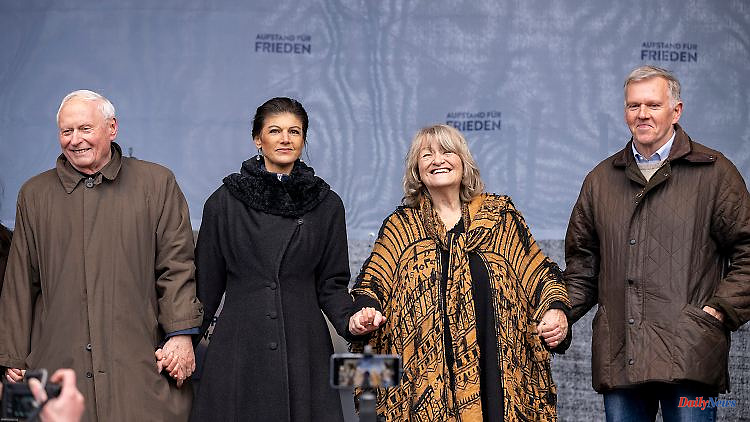The peace rally by Sahra Wagenknecht and Alice Schwarzer is only marginally about the Ukraine - at best it is the scene and the object, not the actor. For Wagenknecht, the United States is to blame for everything anyway.
A clear image of the enemy can't hurt at a demo, and the one on Friday in Berlin, the one for Ukraine, had one thing in common: Putin. Or two, Putin and Russia. That wasn't a bad choice, after all, Putin's Russia invaded Ukraine.
The rally by Alice Schwarzer and Sahra Wagenknecht, which takes place the next day at the Brandenburg Gate, has several enemy images: the former Ukrainian ambassador Andriy Melnyk, the USA, Ukraine and, of course, the Federal Foreign Minister. "I can see," says Schwarzer happily to the boos when she talks about the Green politician, "naming Annalena Baerbock's name is a safe bet here."
In fact, "Baerbock has to go" is chanted several times, unlike the day before, where the slogan "Russia is a terrorist state" dominated. Nobody here would think of saying such a sentence. Ukrainian flags are also clearly underrepresented. Instead, you can see a few Russian and German-Russian friendship flags, posters and flags of the Left Party. The publisher of the "Compact-Magazine", Jürgen Elsässer, has also come to advertise his paper and his sentiments: the Office for the Protection of the Constitution classifies the magazine as right-wing extremist.
How many of the 13,000 participants according to the police estimate and 50,000 according to Wagenknecht have sympathies for right-wing extremists cannot be said - but there is no visual dominance of such figures. Other demonstrators quickly lined up in front of Elsässer and his poster with left-wing posters and shouted "Nazis out". Its magazine is "a Nazi magazine, we don't want them to be here," says one.
Wagenknecht also distances herself from right-wing extremists: Neo-Nazis and Reich citizens have no place at this peace demonstration, she says in her speech. "But that goes without saying, I thought." To add: "But I also say: Anyone who wants to demonstrate with us for peace and negotiations with an honest heart is welcome here. You shouldn't make such a stupid debate out of it, it annoys me at what level of discussion in Germany meanwhile becomes."
Then Wagenknecht turns this "stupid debate" around: She is not "right-wing" and forms a "cross-front" of right-wing and left-wing radicals, but the opposite side is doing this. She accuses Melnyk "and other big names in this country" - meaning Ukraine - of making "no secret" about the fact "that they see a national hero in the Nazi collaborator Stepan Bandera, for example."
You have to explain that: Bandera was one of the most important leaders of the Organization of Ukrainian Nationalists, which was founded in Vienna in 1929 and wanted to fight for an independent Ukrainian state. "The ideology of this organization was fascist, anti-Semitic, anti-Russian and anti-Polish," explained historian Franziska Davies in an interview with ntv.de last year. Militias close to Bandera participated in the extermination of the Jews during World War II and were responsible for the murder of tens of thousands of Poles. Davies also pointed out that Ukraine has only been dealing with its own involvement in the Holocaust since the 1990s - and that Bandera is also very controversial in Ukraine.
During his time as ambassador, Melnyk described Bandera as a Ukrainian "freedom fighter" and denied his responsibility for the massacre of Jews and Poles. He later admitted to the “Spiegel”: “You are right – the Bandera person should be re-examined”.
That's the debate Wagenknecht is referring to when she says a man like that "is revered by Melnyk and others, and our war drummers join them and tell us about transverse fronts and right-wing openness." With her murmuring, Wagenknecht is hinting at Putin's story that a regime of "fascists" and "banderists" rules in Kiev.
Wagenknecht is less concerned with Ukraine as a victim in this war. "Of course, Putin must also be ready for negotiations and compromises. Ukraine must not become a Russian protectorate." As with the neo-Nazis and Reich citizens, there is a but here too. Referring to former Israeli Prime Minister Naftali Bennett, she says: "But according to all the reports we have about the peace negotiations in the spring (...), one has to say that they obviously didn't collapse on the Russian side." There are such reports. However, the matter is by no means as clear as Wagenknecht does, on the contrary: Bennett himself said it was "unclear whether there was any deal that could be made at all".
It's about ending the deaths in Ukraine, Wagenknecht continues, "but it's also about banning the risk of this war spreading to the whole of Europe, possibly to the whole world, and it's damn big, this risk".
Wagenknecht does not apply her warning of nuclear war to Russia. At the very least, it fails to point out that Putin has repeatedly threatened to use nuclear weapons. "We all know that a Russian missile can actually accidentally land on the other side of Ukraine. And what happens then? Will we then have an alliance? Will we then have a world war?" In this depiction, Russia could at most "accidentally" trigger a nuclear war - the main blame lies with the West's reaction.
In general, according to Wagenknecht, "this war is not about noble values, but about NATO and the extent of the American zone of influence." The rally had already begun with this depiction: In a video message announced by Wagenknecht, the US economist Jeffrey Sachs announced that the war did not start on February 24, but in 2014. This has been emphasized frequently right now, on the anniversary.
However, Sachs does not mean the Russian annexation of Crimea and the Donbass war as the starting point. He means the "coup d'etat" against then-Ukrainian President Viktor Yanukovych. It was staged by the USA and was the true beginning of the war, Sachs recounts an old Russian tale. In Ukraine, this "coup d'etat" is remembered as the Maidan revolution. Here, however, Ukraine cannot be imagined as an active player.
Even the war in Ukraine is only an abstract horror at this peace rally. One speaker, Hans-Peter Waldrich, a peace activist from the 1980s, says: "The Ukrainian and Russian youth are massacring themselves on the fronts." Then follows a strange passive construction that leaves open who is acting here: "In the hinterland, people are being destroyed, killed and raped." It is also not mentioned what this "backcountry" is actually called.
Alice Schwarzer does it very similarly: "Ultimately, every war, no matter which side, is about interests and power, about sinecures and geopolitics," she says in her speech. "But for the people it's about their lives." That's why it was "quite right" to "arm up the Ukrainians who were brutally attacked by Russia - initially to defend themselves." It's a rare moment of empathy at this rally.
It is just as right, Schwarzer continues, to ask about the goal and the proportionality of the war. And she asks: "Is the goal the withdrawal of the Russians from the areas occupied since February 24, 2022? That would be legitimate and definitely achievable in negotiations by both sides and with compromises. Or is the goal not just weakening, but Destruction of Russia? That would be neither legitimate nor realistic." These are just questions, but it could be objected that nobody - not the USA, not Baerbock and not Melnyk either - is calling for the "annihilation" of Russia, but only for the withdrawal of the Russians, which Schwarzer describes as legitimate.
Wagenknecht hopes that the rally will give the "starting signal for a new, strong peace movement". The motto of the event, "Revolt for Peace", is reminiscent of her 2018 project "Get Up" with which she wanted to set up a "collective movement".
"You don't need tanks for peace, you need diplomacy for that," she says, and obviously many people in Germany agree: more than 600,000 people have signed Wagenknecht's and Schwarzer's "Manifesto for Peace." Only: what will happen to Ukraine if it no longer gets weapons to defend itself? The speakers don't even ask this question. Their central point is global security: "Now it's about more than the peaceful existence of Ukraine, now it's about the existence of the world," says Schwarzer. She apparently assumes that Putin would be happy if the West dropped Ukraine. A year ago, Wagenknecht said: "We can be very happy that Putin is not as he is portrayed. Namely, a crazy Russian nationalist who gets drunk on pushing borders." She and Schwarzer still seem to be assuming that.












